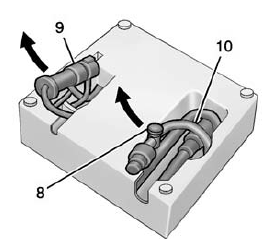Chevrolet Spark Owners Manual: Tire Sealant and Compressor Kit
Warning
Idling a vehicle in an enclosed area with poor ventilation is dangerous. Engine exhaust may enter the vehicle. Engine exhaust contains carbon monoxide (CO) which cannot be seen or smelled.
It can cause unconsciousness and even death. Never run the engine in an enclosed area that has no fresh air ventilation. For more information, see Engine Exhaust on page 9-20.
Warning
Overinflating a tire could cause the tire to rupture and you or others could be injured. Be sure to read and follow the tire sealant and compressor kit instructions and inflate the tire to its recommended pressure. Do not exceed the recommended pressure.
Warning
Storing the tire sealant and compressor kit or other equipment in the passenger compartment of the vehicle could cause injury. In a sudden stop or collision, loose equipment could strike someone. Store the tire sealant and compressor kit in its original location.
If this vehicle has a tire sealant and compressor kit, there may not be a spare tire or tire changing equipment, and on some vehicles there may not be a place to store a tire.
The tire sealant and compressor can be used to temporarily seal punctures up to 6 mm (0.25 in) in the tread area of the tire. It can also be used to inflate an underinflated tire.
If the tire has been separated from the wheel, has damaged sidewalls, or has a large puncture, the tire is too severely damaged for the tire sealant and compressor kit to be effective. See Roadside Assistance Program on page 13-5.
Read and follow all of the tire sealant and compressor kit instructions.
The kit includes: 
- Sealant Canister Inlet Valve
- Sealant/Air Hose
- Base of Sealant Canister
- Tire Sealant Canister
- On/Off Button
- Slot on Top of Compressor
- Pressure Gauge

- Pressure Deflation Button
- Power Plug
- Air Only Hose
- Tire Sealant
- Using the Tire Sealant and Compressor Kit to Temporarily Seal and Inflate a Punctured Tire
- Using the Tire Sealant and Compressor Kit without Sealant to Inflate a Tire (Not Punctured)
 If a Tire Goes Flat
If a Tire Goes Flat
This vehicle has a tire sealant and compressor kit. See Tire Sealant and Compressor
Kit on page 10-56.
There is no spare tire, no tire changing equipment, and no place to store a tire.
It is unusu ...
 Tire Sealant
Tire Sealant
Read and follow the safe handling instructions on the label adhered to the tire
sealant canister (4).
Check the tire sealant expiration date on the tire sealant canister.
The tire sealant canister ...
Other materials:
Finish Care
Application of aftermarket clearcoat sealant/wax materials is not recommended.
If painted surfaces are damaged, see your dealer to have the damage assessed and
repaired. Foreign materials such as calcium chloride and other salts, ice melting
agents, road oil and tar, tree sap, bird droppings, ...
Instrument Panel, Leather, Vinyl, Other Plastic Surfaces, Low Gloss Paint Surfaces
and Natural Open Pore Wood Surfaces
Use a soft microfiber cloth dampened with water to remove dust and loose dirt.
For a more thorough cleaning, use a soft microfiber cloth dampened with a mild soap
solution.
Caution
Soaking or saturating leather, especially perforated leather,
as well as other interior surfaces, may cause per ...
AM-FM Radio
Playing the Radio without Touchscreen
Audio Source Menu
/VOL (Power/Volume): Press to turn
the system on and off. Turn to increase or decrease the volume.
MENU/TUNE: Turn to change the radio station.
RADIO/BAND: Press to select AM and FM.
INFO: Press to display additional information that ma ...
